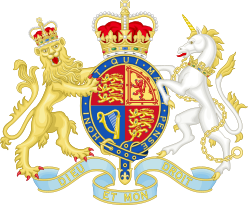| Budget 2013 | |
|---|---|
 | |
| Presented | Wednesday 20 March 2013 |
| Country | United Kingdom |
| Parliament | 55th |
| Party | Coalition government |
| Chancellor | George Osborne |
| Total revenue | £612 billion ($930 billion) (39% of 2012 GDP) |
| Total expenditures | £720 billion ($1.1 trillion) (45% of 2012 GDP) |
| Deficit | £108 billion (6% of 2012 GDP) |
| Website | Budget 2013 documents |
‹ 2012 2014› | |
The 2013 United Kingdom budget was delivered by George Osborne, the Chancellor of the Exchequer, to the House of Commons on Wednesday 20 March 2013. [1]
Contents
- Key measures
- Taxes and revenue
- Taxes
- Benefits and expenditure
- Spending
- Economy
- Public procurement
- References
- External links
It was the fourth budget of the Conservative-Liberal Democrat coalition government that was formed following the 2010 general election, and also the fourth to be delivered by Osborne.
Its key points included an increase in the personal allowance, a reduction of the rate of corporation tax, a freeze of the rate of fuel duty, and the cancellation of the duty escalator on beer. [2]